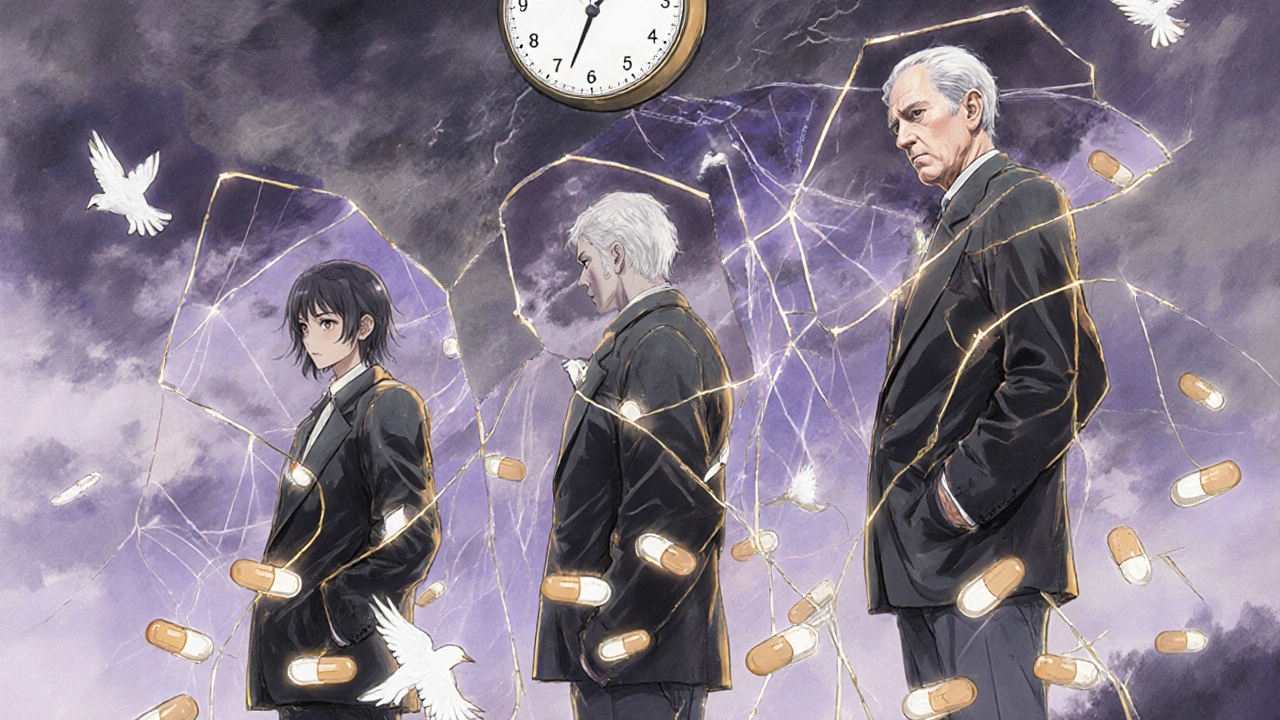Most people start dosulepin because they’re struggling with depression or anxiety that won’t go away. It works. For many, it brings back sleep, appetite, and the ability to get out of bed. But what happens after months-or years-of taking it? The short-term relief is clear. The long-term effects? That’s where things get complicated.
How Dosulepin Works in the Body
Dosulepin is a tricyclic antidepressant (TCA), first developed in the 1960s. It works by increasing levels of serotonin and norepinephrine in the brain-two chemicals that help regulate mood, sleep, and stress response. Unlike newer antidepressants like SSRIs, dosulepin also blocks certain receptors that affect heart rate, digestion, and alertness. That’s why its side effect profile is heavier.
After six to eight weeks, most people notice improvement. But the brain adapts. Over time, the number of serotonin and norepinephrine receptors changes. This isn’t a flaw-it’s biology. The brain tries to balance the extra chemicals the drug is flooding it with. That’s why stopping suddenly can feel like a crash.
Common Long-Term Side Effects
After six months or more of daily dosulepin use, some side effects become more noticeable-and harder to ignore.
- Weight gain: On average, users gain 3-8 kg over 12 months. This isn’t just from increased appetite. Dosulepin slows metabolism slightly and increases cravings for carbs and sweets.
- Dry mouth and constipation: These are common early on, but for long-term users, they often persist. Saliva production drops by up to 40%, and bowel movements slow. Many end up needing laxatives or increased fiber intake.
- Blurred vision: This happens because dosulepin affects the muscles that control the lens in your eye. It’s not dangerous, but it can make reading or driving at night harder.
- Drowsiness and fatigue: While it helps with sleep initially, long-term use can leave you feeling foggy even during the day. Studies show up to 30% of patients report persistent tiredness after two years.
- Orthostatic hypotension: That’s the medical term for dizziness when standing up. Dosulepin lowers blood pressure slightly. For older adults, this increases fall risk by nearly 25%.
These aren’t rare. They’re expected. That doesn’t mean they’re harmless. Chronic dry mouth raises cavity risk. Constipation can lead to hemorrhoids or bowel obstruction. Drowsiness affects work performance and driving safety.
Dependence and Withdrawal
Dosulepin isn’t addictive in the way opioids or benzodiazepines are. But your body becomes physically dependent on it. If you stop abruptly, withdrawal symptoms can hit within 2-3 days.
Common withdrawal signs include:
- Flu-like symptoms (chills, sweating, muscle aches)
- Insomnia or vivid nightmares
- Dizziness and balance issues
- Electric shock sensations in the head or limbs
- Rebound anxiety or depression
A 2023 study in the British Journal of Clinical Pharmacology tracked 142 patients who stopped dosulepin cold turkey. Nearly 70% had moderate to severe withdrawal symptoms lasting 3-8 weeks. Only 12% had no symptoms at all.
Withdrawal isn’t a sign of weakness. It’s a sign your nervous system has adapted. The fix? Slow tapering. Most doctors recommend reducing the dose by 10-25% every 2-4 weeks. Some people need to go even slower-especially if they’ve been on it for over a year.

Impact on Cognitive Function
One of the most concerning long-term effects is subtle cognitive decline. This isn’t dementia. It’s not memory loss like Alzheimer’s. It’s slower processing, trouble finding words, and reduced mental clarity.
A 2022 longitudinal study of 500 adults aged 45-65 on long-term TCAs (including dosulepin) found a 15% decline in executive function scores over three years-compared to a 5% decline in those not on antidepressants. The effect was strongest in people over 60 and those taking doses above 75 mg daily.
It’s not permanent for everyone. Many people regain mental sharpness after stopping, especially if they switch to a different medication or add cognitive therapy. But for some, the fog doesn’t fully lift.
Cardiac Risks Over Time
Dosulepin affects the heart’s electrical system. It can prolong the QT interval-the time it takes for the heart to reset between beats. A longer QT interval increases the risk of dangerous heart rhythms.
For healthy young adults, this is rarely a problem. But for people over 50, those with high blood pressure, or anyone with a family history of heart issues, the risk grows. A 2021 analysis from the European Medicines Agency found that long-term dosulepin use increased the chance of arrhythmia by 40% in patients over 65.
Doctors should check an ECG before starting dosulepin and every 1-2 years after that if you’re on it long-term. If your QT interval goes above 500 milliseconds, most guidelines recommend switching to a safer option.
When to Consider Stopping
Not everyone needs to stay on dosulepin forever. Many people take it for 6-12 months, feel better, and stop. But others stay on it for years because they’re afraid of relapse.
Here’s when it makes sense to talk to your doctor about tapering:
- You’ve been symptom-free for 18+ months
- You’re experiencing significant side effects that affect your quality of life
- You’ve developed new health issues (like heart problems or glaucoma)
- You’re over 65 and taking more than 50 mg daily
- You’re planning pregnancy or are already pregnant
Stopping doesn’t mean failing. It means reassessing. Many people successfully transition to therapy, exercise, or newer antidepressants with fewer long-term risks.

Alternatives to Consider
If you’re on dosulepin long-term and worried about side effects, there are other options.
SSRIs like sertraline or escitalopram are often preferred now. They’re easier on the heart, cause less weight gain, and have milder withdrawal. They don’t work for everyone, but they’re safer for long-term use.
SNRIs like venlafaxine work similarly to dosulepin but with fewer anticholinergic effects (less dry mouth, constipation, blurred vision).
Therapy-especially CBT or mindfulness-based cognitive therapy-has been shown to be as effective as medication for preventing depression relapse, especially when combined with gradual tapering.
Some people use exercise. A 2020 trial found that 30 minutes of brisk walking five times a week reduced depressive symptoms as effectively as low-dose antidepressants in people with mild to moderate depression.
What to Do If You’re Already on Dosulepin Long-Term
If you’ve been taking dosulepin for over a year, here’s what to do next:
- Review your current dose. Is it still the minimum effective dose? Many people stay on the same dose for years, even if they don’t need it.
- Check your weight, blood pressure, and heart rate. Keep a log for your next doctor visit.
- Ask for an ECG if you haven’t had one in the last year.
- Track your mental clarity. Are you forgetting names? Slowing down at work? These matter.
- Don’t stop suddenly. Talk to your doctor about a taper plan-even if you feel fine.
There’s no shame in needing help. But there’s wisdom in asking whether you still need the same help you did five years ago.
Final Thoughts
Dosulepin saved lives. It helped millions get through dark times. But it’s not a lifelong solution for everyone. The long-term effects aren’t theoretical-they’re documented, measurable, and real.
If you’re still on it, don’t panic. But do pay attention. Your body is telling you something. Side effects aren’t just inconveniences. They’re signals.
Ask yourself: Is this still helping me more than it’s hurting? If the answer isn’t clear, it’s time to talk to someone who can help you find a better path forward.
Can dosulepin cause permanent damage?
There’s no strong evidence that dosulepin causes permanent brain or organ damage in most people. However, long-term use can lead to persistent side effects like cognitive slowing, weight gain, or heart rhythm changes, especially in older adults. These often improve after stopping, but not always completely. Regular monitoring reduces the risk of lasting harm.
How long does it take to feel normal after stopping dosulepin?
Withdrawal symptoms usually peak in the first 2 weeks and fade over 4-8 weeks for most people. But full recovery-especially mental clarity and energy levels-can take 3-6 months. Some report lingering fatigue or mood swings for up to a year, especially after long-term use. Slow tapering makes a big difference.
Is dosulepin safer than other antidepressants for long-term use?
No. Dosulepin is generally less safe than newer antidepressants like SSRIs or SNRIs for long-term use. It has more side effects on the heart, brain, and metabolism. Guidelines from the UK’s NICE and the US FDA now recommend TCAs like dosulepin only when other options have failed.
Can you take dosulepin while pregnant?
Dosulepin is not recommended during pregnancy. It crosses the placenta and may increase the risk of neonatal withdrawal symptoms, low birth weight, and temporary breathing issues in newborns. If you’re pregnant or planning to be, talk to your doctor about switching to a safer option like sertraline.
What’s the highest safe dose of dosulepin for long-term use?
The maximum recommended daily dose is 150 mg, but most long-term users do well on 50-75 mg. Doses above 75 mg significantly increase the risk of heart rhythm problems and cognitive side effects. Doctors rarely prescribe more than 75 mg for ongoing treatment unless absolutely necessary.


Been on dosulepin for 4 years. Weight gain? Yes. Dry mouth? Constant. Brain fog? Like walking through syrup. But I’m alive. And that’s something.
My doctor says taper slow. I’m scared to try. What if I crash? I’ve seen people go downhill after stopping.
I’m not proud of this. But I’m not ready to quit either. I’m just… tired.
As a clinical pharmacist, I’ve reviewed over 200 cases of long-term TCA use. The data is unambiguous: dosulepin’s anticholinergic burden significantly elevates dementia risk in patients over 60. The FDA’s 2021 warning on TCAs isn’t rhetoric-it’s epidemiology. And yet, primary care providers still prescribe it as a ‘last resort’ without ever re-evaluating the risk-benefit ratio after 12 months. This isn’t care. It’s inertia.
Let me tell you about my uncle. Took dosulepin for 11 years. Stopped cold turkey because his insurance dropped coverage. Three days later, he was in the ER with hallucinations and a heart rate of 142. They thought it was a stroke. Turns out? Withdrawal. He’s fine now-tapered down over 9 months with a psych nurse holding his hand.
Bottom line: don’t be a hero. Don’t be stubborn. Don’t assume you’re ‘strong enough.’ Your nervous system doesn’t care about your ego.
Thank you for this detailed, evidence-based post. Too many people treat antidepressants like magic pills or moral failures. This is the kind of clarity we need.
If you’re on dosulepin long-term, schedule a medication review with your prescriber. Bring your symptom log. Ask about ECGs. Ask about alternatives. You deserve to be heard. You deserve better than silence.
THEY DON’T WANT YOU TO KNOW THIS BUT DOSULEPIN IS PART OF THE PHARMA GREED MACHINE!!
They keep you hooked so you keep paying! SSRIs cost less but they’re not as profitable! The FDA is corrupted! My cousin’s neighbor’s dog got prescribed this and now it’s a zombie!!
Also, the moon is fake. And your doctor works for Big Pharma. Wake up.
PS: I’m not mad. I’m just… informed.
They say ‘slow taper’ but what if your doctor doesn’t care? What if they’re overworked? What if they don’t even know how to taper properly? I’ve seen people get kicked out of clinics for ‘non-compliance’ when they ask for help.
And don’t even get me started on how they treat withdrawal like it’s ‘all in your head.’
It’s not. It’s your brain screaming for balance. And nobody’s listening.
😭
I’ve been on 50mg for 3 years. Lost 10 pounds after switching to sertraline. My brain feels like it’s not wrapped in cotton anymore.
But I still miss the sleep. Dosulepin gave me deep, dreamless rest. SSRIs? I dream about falling off cliffs. Every night.
Trade-offs, right?
Still worth it.
Wow. So you’re saying the drug that kept you alive for a decade might be slowly killing you? That’s… poetic. And terrifying.
Maybe the real question isn’t ‘should I stop?’
It’s ‘who’s going to help me stop?’
My sister has been on dosulepin for 7 years. She’s 58. Last year she had a fall because of orthostatic hypotension. She didn’t tell anyone for weeks. Thought it was just ‘getting old.’
When we finally got her to the doctor, they said, ‘Have you thought about switching?’ She cried. Said she didn’t want to be a burden.
She’s not a burden. She’s a person.
I’m not a doctor. But I’ve read the studies. And I’ve talked to people who’ve been through this.
If you’re still on dosulepin after 5 years, you’re not ‘failing’-you’re surviving.
But survival isn’t living.
It’s okay to want more than that.
just wanted to say i’ve been on this for 6 years and i’m so tired of being told to ‘just try therapy’ like it’s a magic wand 🤷♀️
therapy didn’t fix my depression. dosulepin did.
now i’m stuck between a rock and a hard place.
and no one gets it.
🥺
As a former NIH researcher, I can tell you this: dosulepin is a relic. The only reason it’s still prescribed is because American healthcare is broken. We prioritize profit over precision. SSRIs are cheaper, safer, and more effective-yet doctors still default to TCAs because they’re ‘familiar.’
This isn’t medicine. It’s negligence dressed in white coats.